GREENEVILLE – About 100 potential students filled Chalmers Conference Center at Tusculum University Saturday, Nov. 16, to learn how the higher education institution could prepare them to be career-ready professionals.
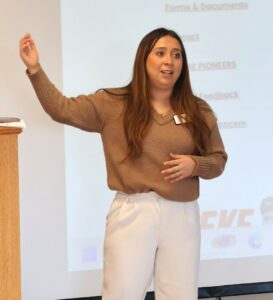
Jaileen Castro, an enrollment representative for the Office of Admission, who organized the open house, talks with potential new students.
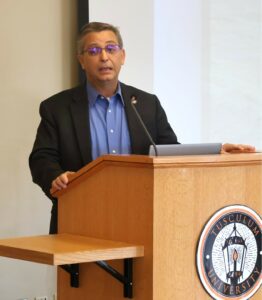
Dr. Scott Hummel speaks with potential new students.
Tusculum’s Office of Admission held an open house to discuss all of its academic offerings and what it can offer socially and spiritually to serve students. Nearly 70 students from the Upward Bound program at the University of Tennessee joined other potential new students to meet in groups with assistant deans, as well as hear from leaders from the Office of Student Affairs, the Office of Financial Aid, Student Support Services and the Office of Advising. SSS serves students whose parents or guardians do not have a bachelor’s degree or who come from low-income households or have a disability.
A major discussion point centered on Tusculum’s delivery of an active and experiential education, which is a component of the university’s mission.
“We believe in a pioneering spirit, curiosity, entrepreneurship and hands-on experiential learning,” Dr. Scott Hummel, Tusculum’s president, told attendees. “You’re really going to be able to learn not just facts and figures and passively being told what to do. We offer a different kind of learning environment.”
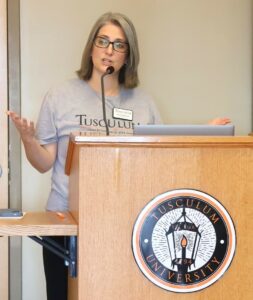
Rachael Barnett discusses Student Support Services, which serves students whose parents or guardians do not have a bachelor’s degree and those who come from low-income households.
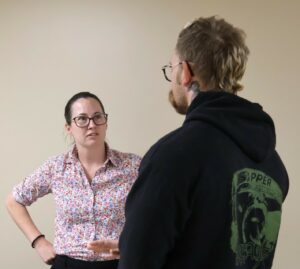
Dr. Melissa Burt, left, an assistant professor of environmental science, speaks with a potential new student.
Dr. Heather Henson-Ramsey, assistant vice president of academic affairs, highlighted the access that biology and environmental science majors have access to outdoor settings, such as the Paul E. Hayden Educational Wetland, College Creek and Tusculum’s Nature Trail, that supplements what they learn in the classroom. Many classes head to these locations on campus to complete their lab work. There is another plus to Tusculum: The university is also just 20 minutes away from Cherokee National Forest.
This produces results. In 2023, two students were completing a class project on the nature trail when they discovered what might be a new crayfish species. The crayfish they found has been sent for genetic testing, and if it truly is a new species, the students will be able to name it, Dr. Henson-Ramsey said. Tusculum students have also documented the presence of an otter as well as vertebrate and invertebrate species on campus.
In addition, chemistry and biology students have been engaged for six years in researching potential new medications to fight cancer. In the spring, multiple students, some of whom had become alumni by that juncture, were published in the prestigious journal Inorganic Chemistry.
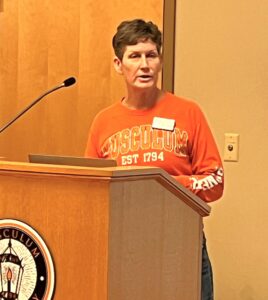
Dr. Suzanne Byrd shares information about the sport science program.
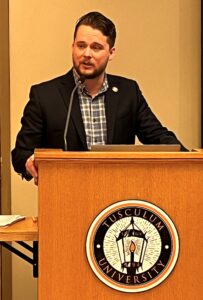
Dr. Nick Davidson discusses the Sport Science Division.
Dr. Nick Davidson, assistant dean of the Sport Studies Division and assistant professor of sport management, said the programs in his area are also heavy on active and experiential learning, such as internships, for students. But he also touted the life experiences of faculty members in the division that are beneficial as they prepare students to enter the workforce. These faculty members have more than 100 years of experience in their respective fields in areas such as college athletics administration to collegiate head coaching.
“Everyone within our programs is student-minded,” Dr. Davidson said. “Our first and foremost priority is making sure that our students get the experience they need not just in the classroom but also outside the classroom. Any facet of sport management or sport science is an extremely competitive industry, and we want to make sure that every graduate that leaves our institution has not only the GPA but also that hands-on experience to put on their resume.”
Dr. Suzanne Byrd, professor of sport science, said Tusculum provides the internships and clinical experiences students need that give them a leg up when they apply for professional programs, such as a master’s degree in athletic training or physical therapy school.
“We’ve been very successful placing our students into those graduate programs,” she said.
Dr. Henson-Ramsey said Tusculum also has success with students who obtain a biology degree and then want to enter the medical field, become a veterinarian or become a dentist or optometrist. She said more than 85 percent of Tusculum graduates who apply for these types of programs are admitted.
One of the reasons for this success is the individualized attention Tusculum provides to prepare students through mock interviews, assistance with résumé development and a freshman seminar course to provide insight into a variety of medical-related professions. That was another element Tusculum emphasized Saturday – that students are not a number because their professors and the higher education institution’s staff know them well and recognize their potential.
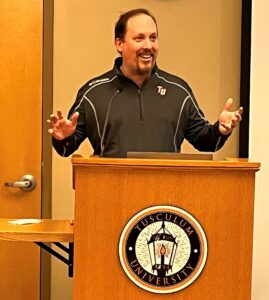
Dr. David Cook talks with potential new Tusculum University students.
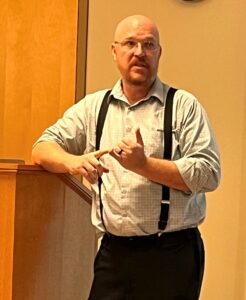
Dr. Robert Gall speaks with attendees at the open house.
“One of the things you can expect across the board, regardless of what program you are in at Tusculum, is that faculty take an interest in you,” said Dr. Robert Gall, assistant dean of the Social Sciences Division and professor of psychology. “If you are not in class, we know it. And if you are not there long enough, we will try to find out why. Part of the reason for that is the more engaged you are in school, the more engaged you are with your faculty and the more engaged you are in classes, that translates to success in college and long term in your career field.”
Dr. David Cook, provost and vice president of academic affairs, reinforced that.
“You will get to know each one of your professors if you want,” he said. “I hope that you will stay behind after class and chat with them – talk to them about life and your career ambitions. You will be in classes that will be academically challenging and rigorous but also where people care. We provide a caring, Christian environment, where professors will deeply invest in you.”
To apply to Tusculum, please visit https://site.tusculum.edu/apply-visit/apply/. More information about the university is available at www.tusculum.edu.


